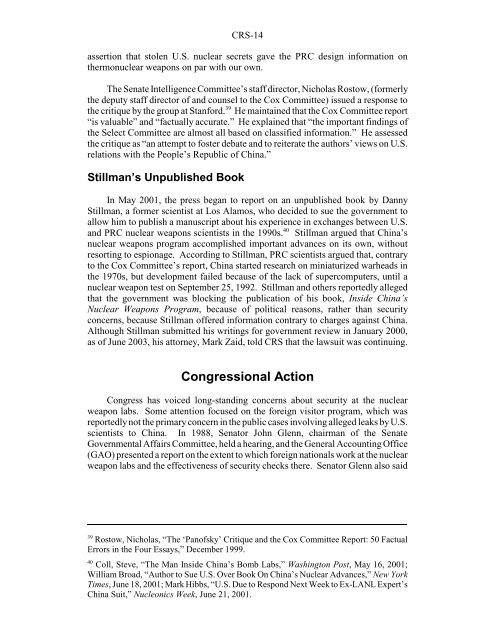China: Suspected Acquisition of U.S. Nuclear Weapon Secrets
China: Suspected Acquisition of U.S. Nuclear Weapon Secrets
China: Suspected Acquisition of U.S. Nuclear Weapon Secrets
You also want an ePaper? Increase the reach of your titles
YUMPU automatically turns print PDFs into web optimized ePapers that Google loves.
CRS-14<br />
assertion that stolen U.S. nuclear secrets gave the PRC design information on<br />
thermonuclear weapons on par with our own.<br />
The Senate Intelligence Committee’s staff director, Nicholas Rostow, (formerly<br />
the deputy staff director <strong>of</strong> and counsel to the Cox Committee) issued a response to<br />
the critique by the group at Stanford. 39 He maintained that the Cox Committee report<br />
“is valuable” and “factually accurate.” He explained that “the important findings <strong>of</strong><br />
the Select Committee are almost all based on classified information.” He assessed<br />
the critique as “an attempt to foster debate and to reiterate the authors’ views on U.S.<br />
relations with the People’s Republic <strong>of</strong> <strong>China</strong>.”<br />
Stillman’s Unpublished Book<br />
In May 2001, the press began to report on an unpublished book by Danny<br />
Stillman, a former scientist at Los Alamos, who decided to sue the government to<br />
allow him to publish a manuscript about his experience in exchanges between U.S.<br />
and PRC nuclear weapons scientists in the 1990s. 40 Stillman argued that <strong>China</strong>’s<br />
nuclear weapons program accomplished important advances on its own, without<br />
resorting to espionage. According to Stillman, PRC scientists argued that, contrary<br />
to the Cox Committee’s report, <strong>China</strong> started research on miniaturized warheads in<br />
the 1970s, but development failed because <strong>of</strong> the lack <strong>of</strong> supercomputers, until a<br />
nuclear weapon test on September 25, 1992. Stillman and others reportedly alleged<br />
that the government was blocking the publication <strong>of</strong> his book, Inside <strong>China</strong>’s<br />
<strong>Nuclear</strong> <strong>Weapon</strong>s Program, because <strong>of</strong> political reasons, rather than security<br />
concerns, because Stillman <strong>of</strong>fered information contrary to charges against <strong>China</strong>.<br />
Although Stillman submitted his writings for government review in January 2000,<br />
as <strong>of</strong> June 2003, his attorney, Mark Zaid, told CRS that the lawsuit was continuing.<br />
Congressional Action<br />
Congress has voiced long-standing concerns about security at the nuclear<br />
weapon labs. Some attention focused on the foreign visitor program, which was<br />
reportedly not the primary concern in the public cases involving alleged leaks by U.S.<br />
scientists to <strong>China</strong>. In 1988, Senator John Glenn, chairman <strong>of</strong> the Senate<br />
Governmental Affairs Committee, held a hearing, and the General Accounting Office<br />
(GAO) presented a report on the extent to which foreign nationals work at the nuclear<br />
weapon labs and the effectiveness <strong>of</strong> security checks there. Senator Glenn also said<br />
39 Rostow, Nicholas, “The ‘Pan<strong>of</strong>sky’ Critique and the Cox Committee Report: 50 Factual<br />
Errors in the Four Essays,” December 1999.<br />
40 Coll, Steve, “The Man Inside <strong>China</strong>’s Bomb Labs,” Washington Post, May 16, 2001;<br />
William Broad, “Author to Sue U.S. Over Book On <strong>China</strong>’s <strong>Nuclear</strong> Advances,” New York<br />
Times, June 18, 2001; Mark Hibbs, “U.S. Due to Respond Next Week to Ex-LANL Expert’s<br />
<strong>China</strong> Suit,” Nucleonics Week, June 21, 2001.
















